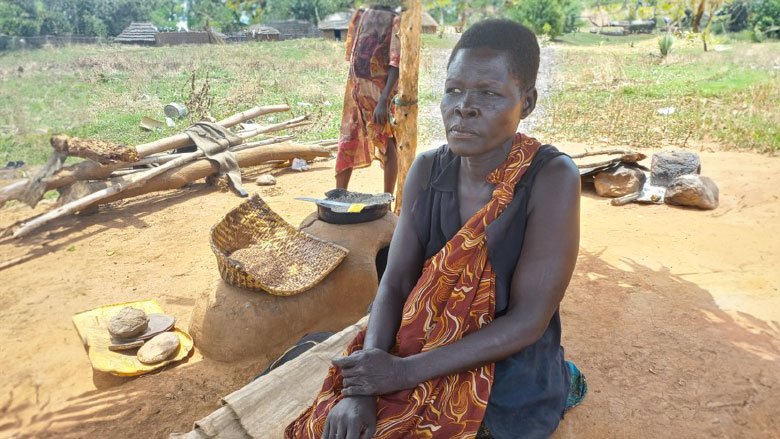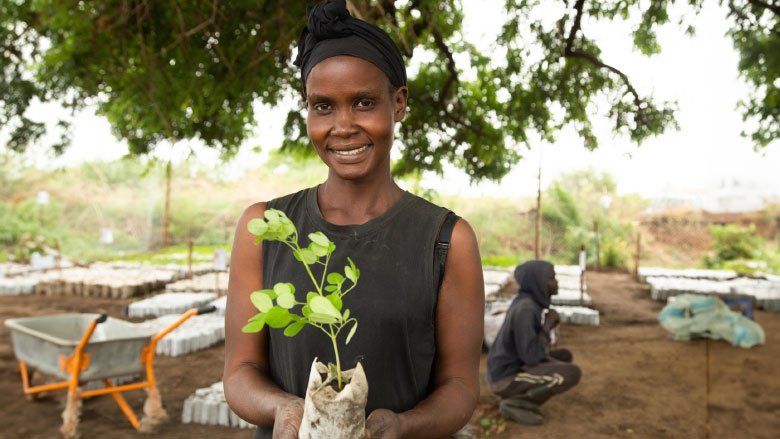JUBA, August 9, 2023−In 2020, South Sudan witnessed the first locust invasion in over 70 years. The locusts destroyed crops and grazing land in many parts of the country, significantly affecting the incomes and food security of thousands of people, the majority of whom were women.

Elizabeth Oriet sits near her house in Liria Payam, Juba County. Photo: Janet Maya Logo / Ministry of Agriculture and Food Security.
The locust invasion is the worst we have seen in this country in over seven decades. As a country whose population heavily relies on subsistence farming, the effects of the invasion greatly affected communities in Eastern Equatoria, Central Equatoria, Northern Bahr el Ghazal, Jonglei, and Upper Nile states.
In response, the International Development Association (IDA) of the World Bank provided a $50.7 million grant to the Ministry of Agriculture and Food Security (MAFS) to increase control and surveillance of new pest outbreaks, to restore livelihoods for vulnerable households and communities affected, and to create a framework for response to such outbreaks in the future. This three-year Emergency Locust Response Project (ERLP) was launched in 2021, aiming to benefit 184,476 households and is one of the first World Bank-financed projects to be implemented through South Sudan’s government systems, specifically through the MAFS with implementation support from the United Nations Office for Project Services (UNOPS) and the Food and Agriculture Organization (FAO).
The ELRP is currently benefiting 49,476 vulnerable households in nine counties from five states in South Sudan through a combination of direct income cash support and Labor-intensive Public Works (LIPW). Elizabeth Saterio Oriet, who cares for her ailing mother, is one of the beneficiaries of the project.
When the civil war conflict intensified in the then Southern Sudan in 1992, Elizabeth and her family fled their home in Liria Payam for Torit in Eastern Equatoria State for safety. On their way, both of Elizabeth’s legs were blown off by an unexploded ordnance, rendering her disabled.
“Since this accident, I have not been engaged in any productive work to sustain my life. I have been surviving on support from my neighbors. However, since I started receiving monthly cash payments from the project, I have been able to buy food for my brother’s children, my sick mother, and myself,” said Elizabeth.
UNOPS has distributed direct cash amounting to $5,778,297 to 23,779 households in seven counties across the country, through the project component focused on safeguarding food security and protecting human capital.
“The support provided through this project went a long way in addressing the immediate to medium-term needs of the vulnerable households, like Elizabeth’s family, who have no able-bodied members within their family to support them. UNOPS would like to thank the Government of South Sudan and the World Bank for coming up with such critical support to the households and communities affected by the desert locusts,” said Leslie Mhara, the Acting Country Manager for UNOPS in South Sudan.
In Juba County, Joyce Oliver is engaged in clearing and rehabilitating a community access road in Rokon Payam.
“We work for three hours daily for fifteen days a month and receive an equivalent of $40.5 to support our families. The road we have rehabilitated has helped to connect us to other parts of our community and for transporting crops from our farmlands to the market,” said Joyce.
Under the LIPW component of the project, there are currently 166 sub-projects being implemented with the aim of building community assets−community access roads, tree nurseries, and schools among others−and at the same time providing jobs and income for people in the community. A group of 59 beneficiaries in Kansuk Boma have grown 50,000 seedlings of different tree and fruit species to help reforest the area to fight climatic change. A total of 25 community nurseries have been established and 14,406 tree seedlings distributed in the project area.
“Because of the current economic crisis, many families rely on cutting down and burning trees to produce charcoal for sale. As a community, we selected the tree nursery sub-project to help grow more trees in our community. We want to replace the trees that we have lost and sell some to the public,” said Sonia Wasuk, a beneficiary of LIPWs.
“As FAO we continue to work closely with the government of South Sudan to support the implementation of programs that promote climate-resilience agronomic practices. We are fully aware that South Sudan’s agricultural sector is vulnerable to climate and weather-related extremes such as drought and floods and the country is still struggling to recover from the devastating effects of the 2019 floods. Climate shocks reduce the resilience of households and communities as it leads to reduced agricultural productivity, water, and energy challenges; this is why our programs are tailor-made to promote climate-conscious agriculture to enhance resilience to these shocks,” said Meshack Malo, FAO South Sudan Country Representative.
Like the direct cash recipients, Sonia and her colleagues receive an equivalent of $40.5 per month. Since the inception of the project, a total of $9,346,297 has been transferred to 46,079 households in the country, helping families survive these difficult times.
“This project aims to strengthen the government’s capacity to monitor and respond to any future locust invasions. Alongside providing cash assistance and opportunities for working on public work schemes, the project also aims to open up market access for communities, to promote the restoration of pastoral and farming systems, and to strengthen the government’s response capacity. Reaching the latter objective will be helped by the recent preparation of a Food Security Crisis Preparedness Plan by the government and all development partners,” said Firas Raad, World Bank Country Manager for South Sudan.
To complement the efforts made by previous social protection projects in the country, the Government of South Sudan and the World Bank are currently delivering the new $129 million Safety Net for Socio-economic Project (SNSOP). It is implemented through the Ministry of Agriculture and Food Security (MAFS) and the Ministry of Gender, Child, and Social Welfare (MGCSW), with implementation support of UNOPS. The project will provide cash transfers and access to income-generating opportunities to 96,000 poor and vulnerable households in 15 selected counties across the country and strengthen effectiveness of the national safety net delivery system.

